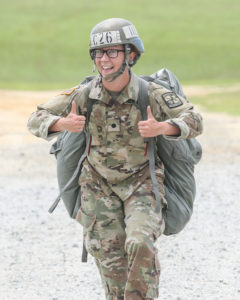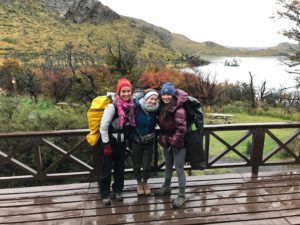Debunking the Myth: Go Abroad as an ROTC Cadet


It can be daunting to spend an entire semester away from campus, especially as an Army ROTC cadet.
We are expected to balance our normal academic curriculum with military science classes, weekend field trainings, and physical fitness all on top of a solid GPA, so it’s no surprise that some cadets shy away from Study Abroad out of the fear that they’ll miss crucial training or be denied consideration for the branch of their choice.

I was in this same situation when I went to visit my Study Abroad Advisor for the first time.
Although an immersive experience was required for my language major, I wasn’t sure how I could make it work.
Most people study abroad their junior year, but third-year cadets have an obligation to stay on campus and I would need special approval from the Office of Global Education to go my sophomore year.
Not only did I have these concerns on the civilian side, but the Army doesn’t consider Spanish – the language I study – to be a “critical” or priority language because it’s already so widely spoken.
How was I going to convince my Battalion Cadre that a semester of eating empanadas in Chile would make me a more valuable asset to the United States Army upon commissioning?
Myth: If I’m in ROTC, it’s impossible go abroad for the semester.
Debunked: Contrary to what you might believe, Study Abroad and ROTC are not mutually exclusive. In fact, they go hand-in-hand.
Part of our job as future officers will be fostering relations with foreign dignitaries and taking care of soldiers who weren’t raised with English as their first language.
Being bilingual is helpful, but Study Abroad goes beyond what you can learn in the classroom: to actually immerse yourself and live in a culture brings a whole new level of awareness that can only be experienced.
In Chile, I felt like I was already positively shaping people’s perception of the United States and the Army simply by asking about aspects of their daily lives and trying to learn the intricacies of their dialect.
They were confused as to why an American would travel all the way to the Southern Cone to learn to speak Spanish, but my Chilean friends were even more surprised when they opened social media and saw pictures of me – a short female – in my Army uniform.
Myth: If I’m gone for a whole semester, I might be denied the summer training I want or miss an application deadline.
Debunked: You may not be physically present on campus, but your Cadre and student Chain of Command will not forget about you.

I was at home preparing to leave for Chile when I got the email from my battalion informing me that I had been selected to attend the U.S. Army Airborne School in Fort Benning, Georgia the summer after I got back.
It had been a dream of mine to learn how to parachute from a fixed-wing plane and I was ecstatic – until I realized the three-week Airborne course would overlap with the last three weeks of my program in Chile.
In a panic, I emailed my IFSA program advisor, Jennifer McKibben, to see if an early departure would even be possible.
The IFSA staff was super understanding of my situation and excited for me to participate in such a cool opportunity; Jennifer and her IFSA Resident Director, Isabel Yevenes, recommended courses for me to take that would allow me to leave early, gave me guidance on how to address the issue with my professors, and worked with me every step of the way to make sure I was hitting certain targets throughout the semester.
My condensed timeline is actually what first inspired me to assume an IFSA Directed Research Project, a study that enriched my understanding of Chile’s political environment and ended up influencing the career path I plan to take with my government major.
When the time actually came for me to leave early, saying goodbye to the friends I had made through IFSA and my host family was one of the hardest things I’ve ever had to do, but I knew that Airborne School would be equally amazing and I couldn’t have made it there without the help of the IFSA staff both stateside and in Santiago.
Myth: If I go abroad for a whole semester, I’ll have a really hard time adjusting back to ROTC.
Debunked: If you take the proper precautions while abroad, your transition back to the fast pace of ROTC can be seamless.

I had four days between my return from Study Abroad and when I left again for Airborne School.
With the bread and wine-heavy diet that I was enjoying in Chile, I knew that my transition into the mental and physical rigor of Airborne would be a huge challenge, especially since I was leaving winter in the Southern Hemisphere to travel to the sweltering Georgia heat.
Even with such harrowing odds, however, there are certain things you can do while Abroad that will help you stay in shape and keep your mind sharp:
1)Find your gym.
You might think you can do 50 push-ups in your room and be fine, but all of that pan y vino will catch up to you on the first APFT if you are not holding yourself accountable.
Sign up for a membership to a gym that’s close to home and either enroll in fitness classes with other people or develop a comprehensive plan to make sure you aren’t cheating yourself out of physical activity.
Not all gyms require memberships either; in Santiago there were free exercise machines built into the city at every block park.
2)Go for runs.
Going for runs while Abroad is not just great exercise, but also the ideal way to explore the neighborhood where you live.
I got lost significantly fewer times after I started recognizing landmarks from my runs.
Just remember to run during the day when there is less of a safety risk, and bring a buddy if you can.
3)Periodically review your military science notes.
I brought my tactical notebook to Chile to look over every other week.
This is especially important if you’re going abroad as a sophomore because junior year is when knowing your tactics really counts.
Additionally, you will most likely be enrolled in a Distance Learning Military Science class and having those notes to reference is critical for completing some assignments.
4)Read military-inspired books.
Your semester Abroad might be one of the only times in college when you have enough free time for recreational reading, so take advantage of it.
While in Chile, I read Red Platoon by Staff Sergeant Clinton Romesha to keep military terms fresh on my mind and further my understanding of combat.
Depending on your region of study, there might be other opportunities for you to exploit to stay on top of your ROTC game.
For example, I went hiking with a couple friends in Patagonia at one point and reverted to my field training knowledge when packing my backpack, planning our route, and setting up our shelter for the night.
It’s up to you to prepare yourself for your return, but the opportunities are out there if you only make use of them.
Myth: I can’t afford to pay for Study Abroad.
Debunked: As a contracted cadet with a scholarship, Army ROTC covers my full tuition both on and off campus.
Georgetown students are expected to pay normal Georgetown tuition for the semester when they go abroad regardless of the cost of their local institution, but my scholarship covered this expense despite me not being around for training.
If you go abroad to an area that speaks a critical language (e.g. China, Russia, etc.), the military could potentially cover the cost of your flight as well.
Since Spanish is not a critical language, I had to cover my own flights, but the largest financial burden was shouldered by the Army.
Keep in mind that this is only if you are a contracted scholarship-winner and the military is already involved in your academic expenses; if you go abroad and are not contracted, you’ll be expected to fund your own abroad experience.
It’s a myth in the ROTC-sphere that Study Abroad is off-limits to cadets; the truth is that study abroad opens doors for you, makes you a more attractive asset to the military, and is an unforgettable experience.
If this is something that interests you – which by now I’m sure it is – put your interest on your Cadre’s radar early and see what amazing options are out there waiting to change your life!
Susan F. | Government and Spanish Major | Georgetown University | IFSA Chilean Universities Program, Santiago | Spring 2018